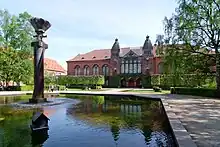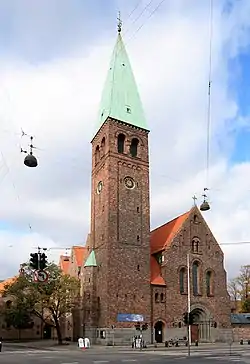
The National Romantic style was a Nordic architectural style that was part of the National Romantic movement during the late 19th and early 20th centuries. It is often considered to be a form of Art Nouveau.
The National Romantic style spread across Denmark, Norway, Sweden, Finland, Estonia, and Latvia, as well as Russia, where it also appeared as Russian Revival architecture. Unlike some nostalgic Gothic Revival style architecture in some countries, Romantic architecture often expressed progressive social and political ideals, through reformed domestic architecture.[1]
Nordic designers turned to early medieval architecture and even prehistoric precedents to construct a style appropriate to the perceived character of people. The style can be seen as a reaction to industrialism and an expression of the same "Dream of the North" Romantic nationalism that gave impetus to renewed interest in the study of the history of Scandinavia, along with the rediscovery of the eddas and sagas of Nordic mythology.
Examples
- Bergen Station (Bergen stasjon) (1913, Norway)
- Copenhagen City Hall (Københavns Rådhus) (1905, Denmark)
- Dresden Saxon District Court (Königlich-Sächsisches Landgericht) (1902, Germany)
- Finnish National Theatre (Suomen Kansallisteatteri) (1902, Finland)
- Frogner Church (Frogner kirke) (1907, Norway)
- Holdre Manor (Holdre mõis) (1910, Estonia)
- National Museum of Finland (Suomen Kansallismuseo) (1905, Finland)
- Norwegian Institute of Technology (Norges tekniske høgskole) (1910, Norway)
- Pohjola Insurance building (1901, Finland)
- Polytechnic Students' Union or Sampo Building (1903, Finland)
- Röhss Museum (Röhsska konstslöjdsmuseet) (1916, Sweden)
- Stockholm City Hall (Stockholms stadshus) (1923, Sweden)
- Stockholm Court House (Stockholms Rådhus) (1915, Sweden)
- Taagepera Castle (Taagepera mõis) (1912, Estonia)
- Tarvaspää, (1913, Finland) the house and studio built for himself by Finnish painter Akseli Gallen-Kallela
- Tolstoy House (Толстовский дом) (1912, Russia)
- Church of the Epiphany (Uppenbarelsekyrkan) (1913, Sweden)
- Vålerenga Church (Vålerenga kirke) (1902, Norway)
- Saint Thérèse of the Child Jesus Church (Parròquia de Santa Teresa del Nen Jesús) (1932, Barcelona)
Sweden
Finland
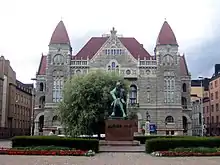
 Detail of Finnish National Theatre facade
Detail of Finnish National Theatre facade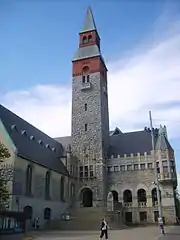
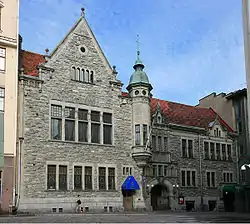 Nylands Nation, Student Nation of Helsinki University
Nylands Nation, Student Nation of Helsinki University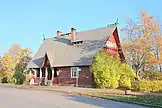 Hollola Municipal House
Hollola Municipal House Alexanterinkatu Facade of Pohjola Insurance building, 1901.
Alexanterinkatu Facade of Pohjola Insurance building, 1901.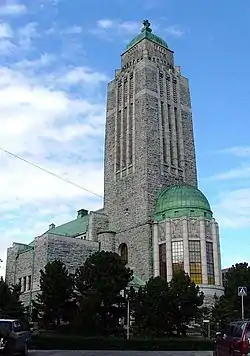 Kallio Church, Helsinki
Kallio Church, Helsinki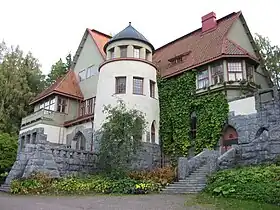
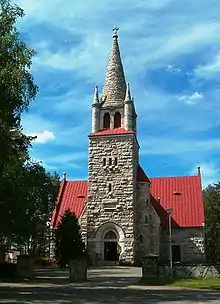 Nilsiä Church, Northern Savonia
Nilsiä Church, Northern Savonia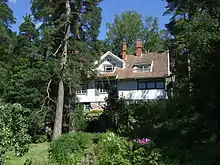
Estonia
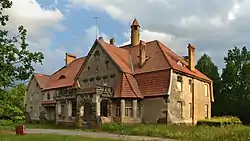 Holdre Manor
Holdre Manor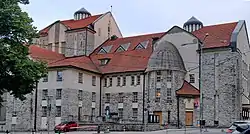

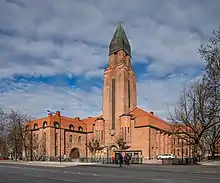
Denmark
Russia

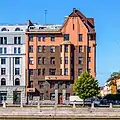 Kapustin house
Kapustin house Putilova house (The Owl House)
Putilova house (The Owl House) Melzer Revenue house
Melzer Revenue house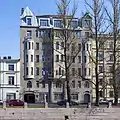 Traynin hoyse
Traynin hoyse Basseynaya Community of Apartment Owners buildings
Basseynaya Community of Apartment Owners buildings Bernstein house
Bernstein house Basser house
Basser house Zazersky house
Zazersky house Markozov house
Markozov house Barsova house
Barsova house Sagalov house
Sagalov house.JPG.webp)
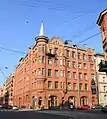 Schmidt house
Schmidt house House of the Latvian Church
House of the Latvian Church Bazhanov house
Bazhanov house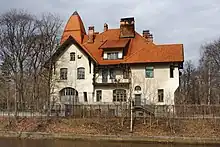 Vollenweider house
Vollenweider house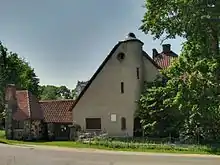 Shcherbov Estate Museum
Shcherbov Estate Museum![Lidval house [ru]](../I/Lidval_House_1.jpg.webp) Lidval house
Lidval house Shrine of Our Lady of Lourdes
Shrine of Our Lady of Lourdes
See also
References
- ↑ Barbara Miller Lane, National Romanticism and Modern Architecture in Germany and the Scandinavian Countries (New York: Cambridge University Press), 2000:10.
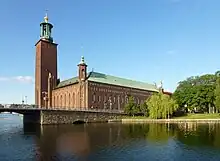

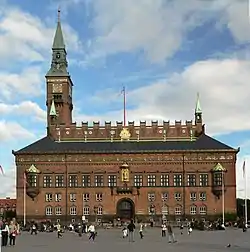
.jpg.webp)
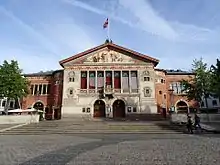
.jpg.webp)
